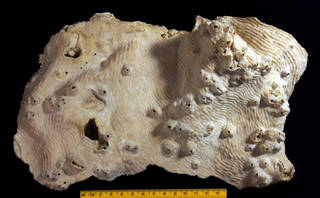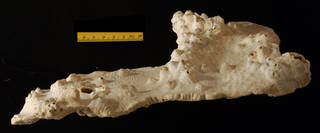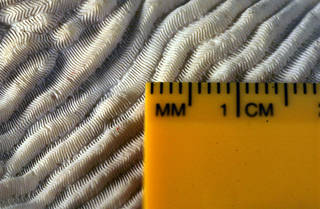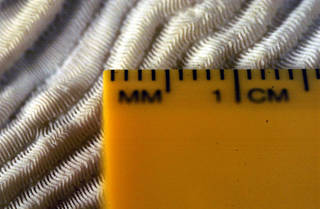
| About | | Search taxa | | Taxon tree | | Search literature | | Checklist | | Stats | | Log in |
WoRMS taxon detailsPachyseris speciosa (Dana, 1846)
207293 (urn:lsid:marinespecies.org:taxname:207293)
accepted
Species
Agaricia (Undaria) levicollis Dana, 1846 · unaccepted > junior subjective synonym
Agaricia (Undaria) speciosa Dana, 1846 · unaccepted > superseded combination (basionym)
Agaricia levicollis Dana, 1846 · unaccepted > junior subjective synonym
Agaricia speciosa Dana, 1846 · unaccepted > superseded combination
Pachyseris clementei Nemenzo, 1955 · unaccepted > junior subjective synonym
Pachyseris haimei Quelch, 1886 · unaccepted > junior subjective synonym
Pachyseris levicollis (Dana, 1846) · unaccepted > junior subjective synonym
marine,
(of Agaricia (Undaria) speciosa Dana, 1846) Dana, J.D. (1846-1849). Zoophytes. United States Exploring Expedition during the years 1838-1842. <em>Lea and Blanchard, Philadelphia.</em> 7: 1-740, 61 pls. (1846: 1-120, 709-720; 1848: 121-708, 721-740; 1849: atlas pls. 1-61)., available online at http://www.sil.si.edu/digitalcollections/usexex/navigation/ScientificText/USExEx19_08select.cfm [details]
Note "East Indies" (Veron, 1986)
From other sources
Type locality "East Indies" (Veron, 1986) [details]
Description Colonies in the Red Sea are foliaceous and encrusting. They may form perfect discs or vases with very long and even,...
Description Colonies in the Red Sea are foliaceous and encrusting. They may form perfect discs or vases with very long and even, concentric valleys (the classical "speciosa" form), or they may develop irregularly contorted sheets with short, broken series, one fairly extreme example of which is illustrated. This degree of contortion, however, stops short of fully ramose development seen in some P. rugosa, but without a lens to examine the columella these may be mistaken for the latter. This is a common species, found mostly in deeper water, mainly on steep to sheer reef walls between 20 to 45 m deep, or in other darker reef habitats. It is mostly limited to clearer water areas, and it commonly coexists with Leptoseris. (Sheppard, 1998 <308>) Colonies are unifacial laminae, usually horizontal, but may develop upright ridges or columns. More than one row of corallites may occur between ridges. Columellae are absent. Colour: pale brown to deep grey. Abundance: common over a wide range of habitats, colonies are seldom over 2 m in diameter. (Veron, 1986 <57>) Colonies plate-like (or partly encrusting) with marked linear arrangement of the inter-corallite septo-costae. The pronounced ridges, which are concentric to the margin of the colony, are distinctive. Colour: beige, grey or light brown. Habitat: diverse, including reef bases. (Richmond, 1997) [details]
Hoeksema, B. W.; Cairns, S. (2024). World List of Scleractinia. Pachyseris speciosa (Dana, 1846). Accessed through: World Register of Marine Species at: https://www.marinespecies.org/aphia.php?p=taxdetails&id=207293 on 2024-09-18
Date action by
original description
(of Agaricia speciosa Dana, 1846) Dana, J.D. (1846-1849). Zoophytes. United States Exploring Expedition during the years 1838-1842. <em>Lea and Blanchard, Philadelphia.</em> 7: 1-740, 61 pls. (1846: 1-120, 709-720; 1848: 121-708, 721-740; 1849: atlas pls. 1-61)., available online at http://www.sil.si.edu/digitalcollections/usexex/navigation/ScientificText/USExEx19_08select.cfm [details]
original description (of Pachyseris haimei Quelch, 1886) Quelch JJ. (1886). Report on the Reef-corals collected by H.M.S. 'Challenger' during the years 1873-76. <em>Report on the Scientific Results of the Voyage of H.M.S. Challenger during the years 1873–1876. Zoology.</em> 16 (46): 1-203, pl. 1-12., available online at http://www.19thcenturyscience.org/HMSC/HMSC-Reports/Zool-46/README.htm [details] original description (of Pachyseris clementei Nemenzo, 1955) Nemenzo, F. (1955). Systematic studies on Philippine shallow water scleractinians: I. Suborder Fungiida. <em>Natural and Applied Science Bulletin, University of the Philippines.</em> 15: 3-84. [details] original description (of Agaricia (Undaria) levicollis Dana, 1846) Dana, J.D. (1846-1849). Zoophytes. United States Exploring Expedition during the years 1838-1842. <em>Lea and Blanchard, Philadelphia.</em> 7: 1-740, 61 pls. (1846: 1-120, 709-720; 1848: 121-708, 721-740; 1849: atlas pls. 1-61)., available online at http://www.sil.si.edu/digitalcollections/usexex/navigation/ScientificText/USExEx19_08select.cfm [details] original description (of Agaricia (Undaria) speciosa Dana, 1846) Dana, J.D. (1846-1849). Zoophytes. United States Exploring Expedition during the years 1838-1842. <em>Lea and Blanchard, Philadelphia.</em> 7: 1-740, 61 pls. (1846: 1-120, 709-720; 1848: 121-708, 721-740; 1849: atlas pls. 1-61)., available online at http://www.sil.si.edu/digitalcollections/usexex/navigation/ScientificText/USExEx19_08select.cfm [details] context source (Hexacorallia) Fautin, Daphne G. (2013). Hexacorallians of the World. (look up in IMIS) [details] basis of record Veron JEN. (1986). Corals of Australia and the Indo-Pacific. <em>Angus & Robertson Publishers.</em> [details] additional source Sheppard CRC. (1987). Coral species of the Indian Ocean and adjacent seas: a synonymised compilation and some regional distribution patterns. <em>Atoll Research Bulletin.</em> 307: 1-32., available online at http:// https://doi.org/10.5479/si.00775630.307.1 [details] additional source Hoffmeister, J.E. (1925). Some corals from America Samoa and the Fiji Islands. <em>Papers from the Department of Marine Biology of the Carnegie Institution of Washington.</em> 22: 1-90, pls. 1-23. page(s): 10, 12, 35, 36 [details] additional source Vaughan TW. (1918). Some shallow-water corals from Murray Island (Australia), Cocos-Keeling Island, and Fanning Island. <em>Papers from the Department of Marine Biology of the Carnegie Institution of Washington.</em> 9 (213): 49-234, pls. 20-93. [details] additional source Quelch JJ. (1886). Report on the Reef-corals collected by H.M.S. 'Challenger' during the years 1873-76. <em>Report on the Scientific Results of the Voyage of H.M.S. Challenger during the years 1873–1876. Zoology.</em> 16 (46): 1-203, pl. 1-12., available online at http://www.19thcenturyscience.org/HMSC/HMSC-Reports/Zool-46/README.htm page(s): 25, 31, 32, 123-124, 201 [details] additional source Cairns, S.D., B.W. Hoeksema & J. van der Land. (1999). Appendix: List of extant stony corals. <em>Atoll Research Bulletin.</em> 459: 13-46. page(s): 18 [details] additional source Randall RH. (2003). An annotated checklist of hydrozoan and scleractinian corals collected from Guam and other Mariana Islands. <em>Micronesica.</em> 35-36: 121-137. page(s): 130 [details] additional source Cairns, S.D., B.W. Hoeksema & J. van der Land. (2007). as a contribution to UNESCO-IOC Register of Marine Organisms. (look up in IMIS) [details] additional source Liu, J.Y. [Ruiyu] (ed.). (2008). Checklist of marine biota of China seas. <em>China Science Press.</em> 1267 pp. (look up in IMIS) [details] Available for editors additional source Veron JEN, Pichon M. (1980). Scleractinia of Eastern Australia – Part III. Family Agariciidae, Siderastreidae, Fungiidae, Oculinidae, Merulinidae, Mussidae, Pectinidae, Caryophyllidae, Dendrophylliidae. <em>Australian Institute of Marine Science Monograph Series.</em> 4: 1-459. [details] additional source Nemenzo, F. (1955). Systematic studies on Philippine shallow water scleractinians: I. Suborder Fungiida. <em>Natural and Applied Science Bulletin, University of the Philippines.</em> 15: 3-84. page(s): 5, 18-20, Plate IV, fig. 4 [details] additional source van der Horst, C.J. (1921). The Madreporaria of the Siboga expedition: 2. Madreporaria Fungida. Siboga-Expeditie: uitkomsten op zoölogisch, botanisch, oceanographisch en geologisch gebied verzameld in Nederlandsch Oost-Indië 1899-1900 aan boord H.M. Siboga onder commando van Luitenant ter Zee 1e kl. G.F. Tydeman, XVIb. E.J. Brill: Leiden. 53-98, plates I-VI pp. (look up in IMIS) page(s): 4, 35, 45-46 [details] additional source Veron JEN. (2000). Corals of the World. Vol. 1–3. <em>Australian Institute of Marine Science and CRR, Queensland, Australia.</em> [details] additional source Scheer G, Pillai CSG. (1974). Report on Scleractinia from the Nicobar Islands. <em>Zoologica, Stuttgart.</em> 42(122): 1-75. page(s): 8, 34, 75, Plate 16 [details] additional source Umbgrove JHF. (1939). Madreporaria from the Bay of Batavia. <em>Zoologische Mededelingen, Leiden.</em> 22: 1-64. page(s): 16, 45-46 [details] additional source Yabe H, Sugiyama T, Eguchi M. (1936). Recent reef-building corals from Japan and the South Sea Islands under the Japanese mandate. I. <em>The Science reports of the Tôhoku Imperial University, Sendai, 2nd Series (Geologie).</em> Special Volume 1: 1-66, pls. 1-59. page(s): 5, 63, Pl. XLIII [details] additional source Yabe H, Sugiyama T. (1935). Revised list of the reef-corals from the Japanese seas and of the fossil reef corals of the raised reefs and the Ryukyu limestone of Japan. <em>Journal of the Geological Society of Japan.</em> 42: 379-403. page(s): 387, 389, 391 [details] additional source Studer, T. (1880). Beitrag zur Fauna der Steinkorallen von Singapore. <em>Mittheilungen der Naturforschenden Gesellschaft in Bern.</em> 979: 15-53., available online at https://www.biodiversitylibrary.org/page/12090774 page(s): 47 [details] additional source Crossland C (1952) Madreporaria, Hydrocorallinae, Heliopora and Tubipora. Scientific Report Great Barrier Reef Expedition 1928-29 VI(3): 85-257. page(s): 92 [details] additional source Milne Edwards H (1860) Histoire naturelle des coralliaires ou polypes proprement dits 3: 1-560. Librairie Encyclopédique de Roret, Paris. (look up in IMIS) [details] additional source Pichon, M.; Benzoni, F. (2007). Taxonomic re-appraisal of zooxanthellate Scleractinian Corals in the Maldive Archipelago. <em>Zootaxa.</em> 1441: 21–33. page(s): 29 [details] additional source Matthai G (1924) Report on the madreporarian corals in the collection of the Indian Museum, Calcutta. Memoirs of the Indian Museum 8: 1-59. [details] additional source Kitahara, M.V., J. Stolarski, S.D. Cairns, F. Benzoni, J.L. Stake & D.J. Miller. (2012). The first modern solitary Agariciidae (Anthozoa, Scleractinia) revealed by molecular and microstructural analysis. <em>Invertebrate Systematics.</em> 26 (3): 303-315., available online at https://doi.org/10.1071/is11053 page(s): 305, 307, 311, 314 [details] Available for editors additional source Veron JEN, Marsh LM. (1988). Hermatypic corals of Western Australia : records and annotated species list. <em>Records Western Australian Museum Supplement.</em> 29: 1-136., available online at https://doi.org/10.5962/bhl.title.60555 page(s): 32, 80 [details] additional source Pillai CSG. (1972). Stony corals of the seas around India. <em>Proceedings of the First International Symposium on Corals and Coral Reefs, 1969. Marine Biological Association of India Symposium.</em> 5: 191-216. page(s): 202 [details] additional source Boshoff, P.H. (1981). An annotated checklist of Southern Africa Scleractinia. <em>Oceanographic Research Institute Investigational Report, Durban.</em> 49: 1-45. page(s): 20 [details] additional source Randall RH, Myers RF. (1983). The corals. Guide to the Coastal Resources of Guam: Vol. 2. <em>University of Guam Press, Guam, pp. 128.</em> [details] additional source Veron, J. E. N. (2000). Corals of the World, Volume II: Families Astrocoeniidae, Pocilloporidae, Euphyllidae, Oculinidae, Meandrinidae, Siderastreidae, Agariciidae, Fungiidae, Rhizangiidae, Pectiniidae, Merulinidae, Dendrophylliidae, Caryophylliidae. Australian Institute of Marine Science. Townsville., volume 2, pp. 429. page(s): 228-229 [details] additional source Wells JW. (1954). Recent corals of the Marshall Islands: Bikini and nearby atolls, part 2, oceanography (biologic). <em>U.S. Geological Survey Professional Paper.</em> 260(I): 385-486. page(s): 392, 399, 446 [details] additional source Reed, J. K. (1985). Deepest distribution of Atlantic hermatypic corals discovered in the Bahamas. Proceedings of the Fifth International Coral Reef Congress, 6, 249-254 page(s): 253 [details] additional source Pillai CSG. (1983). Structure and generic diversity of recent Scleractinia of India. <em>Journal of the Marine Biological Association of India.</em> 25, 1-2, 78-90. page(s): 85 [details] additional source Veron, J. E. N.; Pichon, M. (1979). Scleractinia of Eastern Australia, part III: Families Agariciidae, Siderastreidae, Fungiidae, Oculinidae, Merulinidae, Mussidae, Pectiniidae, Caryophylliidae, Dendrophylliidae. Australian Government Publishing Service. Canberra., volume 4, pp. 422. page(s): 81, 82-84 [details] additional source Sheppard, C. R. C. (1985). Fringing reefs in the southern region, Jeddah to Jizan. Fauna of Saudi Arabia, 7, 37-58 page(s): 46 [details] additional source Kühlmann, D. H. H. (2006). Die Steinkorallensammlung im Naturhistorischen Museum in Rudolstadt (Thüringen) nebst ökologischen Bemerkungen. Rudolstädter Naturhistorische Schriften, 13, 37-113 page(s): 62, 77, 113 [details] new combination reference Milne Edwards H, Haime J. (1851). Recherches sur les polypiers. Mémoire 6. Monographie des Fongides. <em>Annales des Sciences Naturelles, Zoologie, Series 3.</em> 15: 73-144. [details]  Present Present  Present in aphia/obis/gbif/idigbio Present in aphia/obis/gbif/idigbio  Inaccurate Inaccurate  Introduced: alien Introduced: alien  Containing type locality Containing type locality
Nontype (of Pachyseris levicollis (Dana, 1846)) BMNH, geounit Vietnamese Exclusive Economic Zone [details]
Nontype (of Pachyseris levicollis (Dana, 1846)) HLD X2: 156-13, geounit Indian Exclusive Economic Zone [details]
Nontype (of Pachyseris levicollis (Dana, 1846)) MSI 61-CC, geounit Philippines Exclusive Economic Zone [details]
Nontype (of Pachyseris levicollis (Dana, 1846)) UAZM [details]
Nontype (of Pachyseris levicollis (Dana, 1846)) UAZM [details]
Nontype (of Pachyseris levicollis (Dana, 1846)) UAZM, geounit Indonesian Exclusive Economic Zone [details]
Nontype HLD X2: 127-37, geounit Indian Exclusive Economic Zone [details]
Nontype IGPS 40270, geounit Palau Exclusive Economic Zone [details]
Nontype IGPS 40364, geounit Palau Exclusive Economic Zone [details]
Nontype IGPS 51042, geounit Palau Exclusive Economic Zone [details]
Nontype IGPS 51090, geounit Palau Exclusive Economic Zone [details]
Nontype IGPS 53089, geounit Micronesian Exclusive Economic Zone [details]
Nontype IGPS 53250, geounit Palau Exclusive Economic Zone [details]
Nontype NMSR 8577, geounit Eritrean Exclusive Economic Zone [details]
Nontype NMSR, geounit Philippines Exclusive Economic Zone [details]
Nontype UAZM [details]
Nontype UAZM, geounit Indonesian Exclusive Economic Zone [details]
Nontype WAM 153-74, geounit Australian Exclusive Economic Zone [details]
Nontype WAM 155-81, geounit Australian Exclusive Economic Zone [details]
Nontype WAM 175-78, geounit Australian Exclusive Economic Zone [details]
Nontype WAM 176-78, geounit Australian Exclusive Economic Zone [details]
Nontype WAM 204-77, geounit Australian Exclusive Economic Zone [details]
Nontype WAM 205-77, geounit Australian Exclusive Economic Zone [details]
Nontype WAM 391-77, geounit Australian Exclusive Economic Zone [details]
Nontype WAM 392-77, geounit Australian Exclusive Economic Zone [details]
Nontype WAM 418-83, geounit Australian Exclusive Economic Zone [details]
Nontype WAM 431-77, geounit Australian Exclusive Economic Zone [details]
Nontype WAM 52-81, geounit Australian Exclusive Economic Zone [details]
Nontype WAM 95-74, geounit Australian Exclusive Economic Zone [details]
Unknown type (of Pachyseris clementei Nemenzo, 1955) MSI C-451, geounit Philippines Exclusive Economic Zone [details]
Unknown type (of Pachyseris clementei Nemenzo, 1955) MSI C-94, geounit Philippines Exclusive Economic Zone [details]
Unknown type BMNH, geounit Maldives Exclusive Economic Zone [details]
Unknown type IMC Zev 7393/7, geounit Myanmar Exclusive Economic Zone [details]
Unknown type IMC Zev 7394/7, geounit Myanmar Exclusive Economic Zone [details]
Unknown type MSI C-133, geounit Philippines Exclusive Economic Zone [details]
Unknown type MSI C-364 [details]
From editor or global species database
Biology zooxanthellate [details]From other sources
Description Colonies in the Red Sea are foliaceous and encrusting. They may form perfect discs or vases with very long and even, concentric valleys (the classical "speciosa" form), or they may develop irregularly contorted sheets with short, broken series, one fairly extreme example of which is illustrated. This degree of contortion, however, stops short of fully ramose development seen in some P. rugosa, but without a lens to examine the columella these may be mistaken for the latter. This is a common species, found mostly in deeper water, mainly on steep to sheer reef walls between 20 to 45 m deep, or in other darker reef habitats. It is mostly limited to clearer water areas, and it commonly coexists with Leptoseris. (Sheppard, 1998 <308>)Colonies are unifacial laminae, usually horizontal, but may develop upright ridges or columns. More than one row of corallites may occur between ridges. Columellae are absent. Colour: pale brown to deep grey. Abundance: common over a wide range of habitats, colonies are seldom over 2 m in diameter. (Veron, 1986 <57>) Colonies plate-like (or partly encrusting) with marked linear arrangement of the inter-corallite septo-costae. The pronounced ridges, which are concentric to the margin of the colony, are distinctive. Colour: beige, grey or light brown. Habitat: diverse, including reef bases. (Richmond, 1997) [details] Type locality "East Indies" (Veron, 1986) [details]
To Barcode of Life (11 barcodes)
To Biodiversity Heritage Library (28 publications) To Biological Information System for Marine Life (BISMaL) To European Nucleotide Archive, ENA (Pachyseris speciosa) To GenBank (2390 nucleotides; 11 proteins) To GenBank (2390 nucleotides; 11 proteins) (from synonym Agaricia speciosa Dana, 1846) To IUCN Red List (Least Concern) To MNHN Fossil collection (Pachyseris levicollis (DANA, 1846); Figuré; F.A30286) (from synonym Pachyseris levicollis (Dana, 1846)) To NMNH Extant Collection (IZCOE190wholecolony) (from synonym Agaricia levicollis Dana, 1846) To NMNH Extant Collection (IZCOE199closeup) (from synonym Agaricia speciosa Dana, 1846) To USNM Invertebrate Zoology Cnidaria Collection (1 record) (from synonym Agaricia levicollis Dana, 1846) To USNM Invertebrate Zoology Cnidaria Collection (1 record) (from synonym Pachyseris levicollis (Dana, 1846)) To USNM Invertebrate Zoology Cnidaria Collection (54 records) To USNM Invertebrate Zoology Cnidaria Collection (Holotype USNM 199) (from synonym Agaricia speciosa Dana, 1846) To ITIS |





